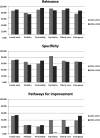CanMEDS Competencies in Family Medicine Residents: Can Criterion-Based Assessment Improve the Quality of Teacher Feedback?
- PMID: 38486592
- PMCID: PMC10939571
- DOI: 10.15694/mep.2021.000016.1
CanMEDS Competencies in Family Medicine Residents: Can Criterion-Based Assessment Improve the Quality of Teacher Feedback?
Abstract
This article was migrated. The article was marked as recommended. Background: The Université Laval family medicine program has developed an innovative computerized tool called the criterion-based Competency Assessment Tool (CAT), currently undergoing validity assessment. Methods: This study followed a qualitative design assessing written comments collected in the assessment reports from the cohorts before and after the implementation of the CAT (n pre = 200, n post = 200) in order to ascertain the tool's consequence validity. A deductive thematic content analysis was performed and pre- and post-implementation cohorts were compared. Findings: Overall feedback quality does not appear to have changed between cohorts. When analyzing CanMEDS roles separately, each is covered more often, but related comments appear to be less specific. The new report also seems to enable the teacher to tell more with the same number of words. Conclusions: Perhaps since the items are complete, exhaustive, and detailed enough to be self-explanatory, the tool helps the teacher to cover a wider area of competencies without the need to add many details with narrative comments. Consequence validity does not seem to have been substantially affected by changes in the family medicine resident's competency assessment, but the results do not support the contention that comment quality has improved either.
Keywords: Computed-based feedback; criterion-based assessment; family medicine residency.; feedback.
Copyright: © 2021 Simard C et al.
Figures





Similar articles
-
Validity and Utility of the CanMEDS "Resident as Teacher Multisource Feedback" Assessment Tool for Resident-led Structured Teaching.Can Geriatr J. 2025 Jun 4;28(2):154-160. doi: 10.5770/cgj.28.795. eCollection 2025 Jun. Can Geriatr J. 2025. PMID: 40463644 Free PMC article.
-
A Qualitative Textual Analysis of Feedback Comments in ePortfolios: Quality and Alignment with the CanMEDS Roles.Perspect Med Educ. 2023 Dec 22;12(1):584-593. doi: 10.5334/pme.1050. eCollection 2023. Perspect Med Educ. 2023. PMID: 38144672 Free PMC article.
-
Expectations of clinical teachers and faculty regarding development of the CanMEDS-Family Medicine competencies: Laval developmental benchmarks scale for family medicine residency training.Teach Learn Med. 2014;26(3):244-51. doi: 10.1080/10401334.2014.914943. Teach Learn Med. 2014. PMID: 25010235
-
Impact of summer programmes on the outcomes of disadvantaged or 'at risk' young people: A systematic review.Campbell Syst Rev. 2024 Jun 13;20(2):e1406. doi: 10.1002/cl2.1406. eCollection 2024 Jun. Campbell Syst Rev. 2024. PMID: 38873396 Free PMC article. Review.
-
Initial performance of a modified milestones global evaluation tool for semiannual evaluation of residents by faculty.J Surg Educ. 2013 Nov-Dec;70(6):739-49. doi: 10.1016/j.jsurg.2013.08.004. J Surg Educ. 2013. PMID: 24209650 Review.
References
-
- Baron R.(1988) Negative effects of destructive criticism: Impact on conflict, self-efficacy, and task performance. Journal of Applied Psychology. 73(2), pp.199–207. https://doi.org/10.1037/0021-9010.73.2.199 - DOI - PubMed
LinkOut - more resources
Full Text Sources
Miscellaneous

